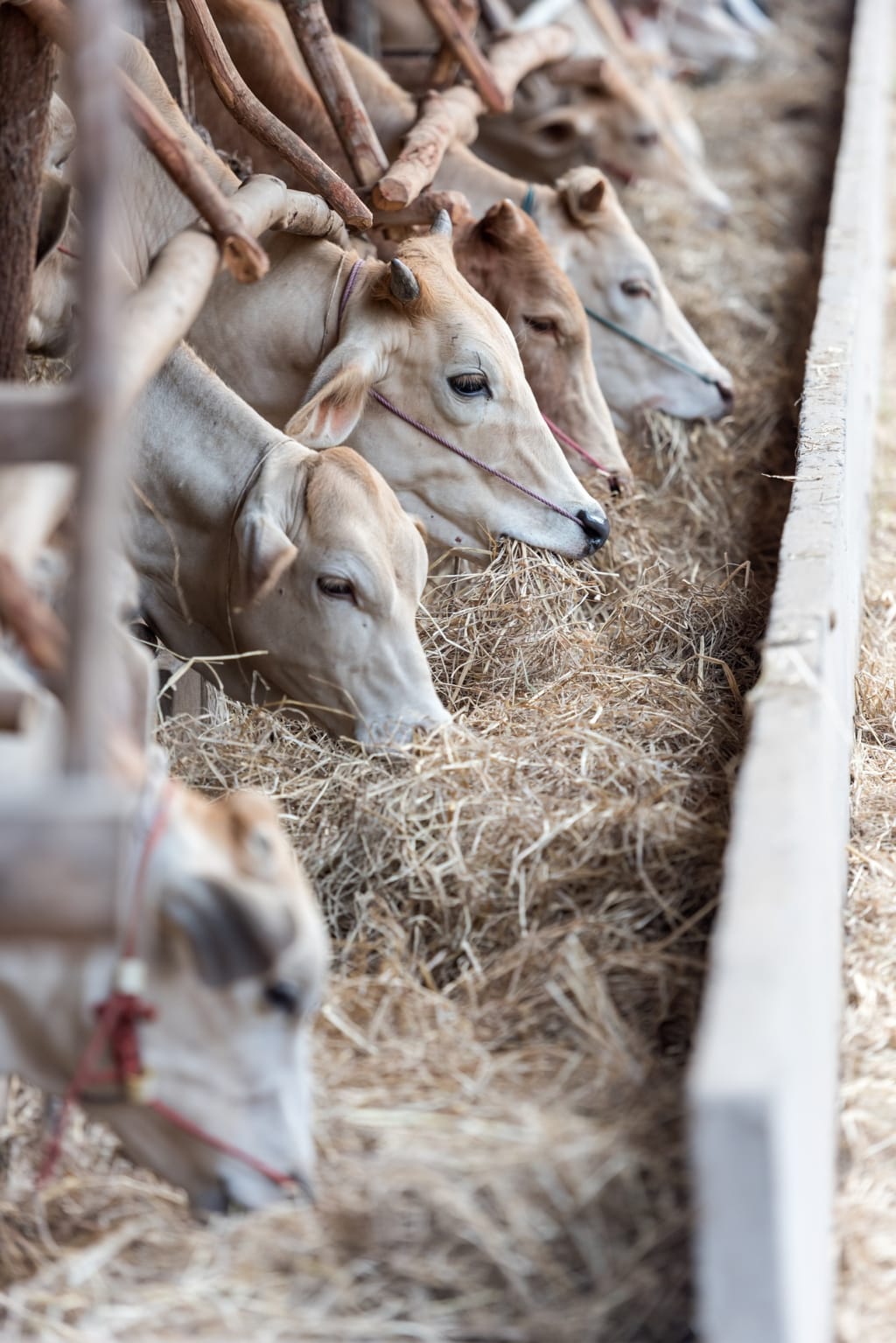The Reality of Ranch Animals
Why They Should Be Respected

Food is important. Everyone needs to eat in order to survive. Thankfully, there is no need for people to go and slaughter their own meat anymore, as there are markets and grocery stores that provide food nicely packaged and easy to prepare. Unfortunately, this level of comfort comes with a degree of ignorance. Over the past few years, it has become increasingly obvious that people, Americans specifically, do not know how their food is made. This applies to many things, including meat. Ranchers are a big part of the food industry, raising animals such as cows and chickens to later be killed by businesses to provide the packaged meat we find in grocery stores. However, raising an animal is a commitment that takes money and time, two things that really hinder the money-making process. Therefore, it is not uncommon to see the animals be neglected and mistreated to the point of deliberate abuse. Meat production is directly influenced by how the animals are treated. Healthy ranch animals are important to the food industry because it decreases chances of disease outbreaks and strengthens the economy, as well as creates a good image for the food production and overall industry.
First, diseases spread easier in dirty and unkempt environments. Factory farms, an area where animals are kept in an enclosed and small space, are known for keeping their animals in disgusting enclosures together. It seems obvious that the areas where food is kept and raised should be kept clean and organized, to minimize the risk of a disease outbreak. This is supported by an article by Farm Sanctuary who states, “...overcrowded factory farms, which are a breeding ground for disease, including emerging pathogens and virulent strains of antibiotic-resistant bacteria” (“A Hazard…”). Some very common diseases that are often seen are E. coli and salmonella. Both diseases have horrible effects on people, and can result in death. Taking steps to ensure that outbreaks are statistically rare should be an important part of the meat industries job.
However, it is overshadowed by money. The point of a business is to make money. A lot of big businesses that have to do with food, specifically meat, prioritize cost efficiency over the animals well-being and quality of life. The idea seems to be that one or two contaminated batches is justifiable when compared with the amount of product that is being sold. Ultimately, businesses believe that getting food to people faster and cheaper should be a high priority in the meat industry. This means that the animals get treated with obvious neglect and abuse.
This can be fixed, in part, by grazing. Grazing is when the animals, such as cows, are allowed to walk on a field of grass and weeds and they eat that instead of processed feed. While this does take up significantly more space, it lessens the cost of food. Grazing is also better for the animals. On factory farms, the animals commonly eat corn. The United States grows a lot of corn, and “...roughly 36 percent of U.S. corn, plus distillers grains left over from ethanol production, is fed to cattle, pigs and chickens” (Foley). Aside from the fact that cattle are not biologically made to eat and digest corn, that is a lot of food that is going to animals instead of people. If the animals already have an available food source in the form of naturally occurring grass and weeds, why is valuable food that they don’t need given to them in the first place.
Furthermore, a healthy environment for ranch animals to live in while they are being raised strengthens the economy, specifically in America and other countries with a capitalist system of economics. Capitalism is driven by competition. This is true for all business, agriculture included. Stephen Goetz is a professor of agriculture and economics at Penn State. In an article on business, he is cited saying, “Big companies that employ more than 500 workers and that are headquartered in other states are associated with slower economic growth” (“How Big…”). Big agricultural businesses have thousands of employees on average. Further on in the article, it explains that many big businesses over shadow small ones, taking the funds that start-ups need and making costs higher. With no competition, these big companies can basically do what they want. Agriculture is a huge business, everywhere in the world. People need to eat. Crippling it’s influence in the economy can lead to horrible consequences.
Contrarily, the biggest need for big business comes in the form of longevity. An analytical article on capitalism states, “If the vast majority of most firms’ value depends on results more than three years from now, but management is preoccupied with what’s reportable three months from now, then capitalism has a problem” (Barton). Many small businesses think in the short term. They either haven’t been around long or don’t have the funds needed for a long-term plan. Without a long term plan, businesses are almost always headed for failure. The value of big business is obvious here; they make a profit. However, this is a self-fulfilling prophecy. By bolstering big businesses and near-monopolies, small businesses don’t have to think in the long term. Their future is determined by the economic power of whoever controls the industries.
Basic economics says that the higher the demand for a product, the more supply is needed. If small farmers and ranchers can never get started, if they have no supply, many people who want to buy from them won’t be able to, as the supply can not meet demand. The only way for these farmers and ranchers to successfully start up their business is if there is an available market. This market is taken away when big businesses monopolize the industry. When this happens, there is no backup for possible business-caused dips in the economy. The article mentioned earlier states, “Big businesses also create recessions…” (“How Big…”). How well the business is doing directly correlates to either the spike or recession of the economy through their stocks and overall influence. This can hurt the economy badly, as seen throughout history. Jay Cooke and J.P. Morgan creating depressions when their companies were suffering, accidental or not, are both prime examples. Their businesses were hurt, leading a national recession that people felt all over America.
Lastly, ensuring that ranch animals have a good, and clean environment is important because the animals keep the meat industry going, and a bad image tarnished with pictures of abuse will lead to consequences for the businesses and the ranchers. As more and more corporations are being exposed for having abusive factories, people are protesting the treatment of the animals. They are boycotting the businesses and convincing other people to do the same. Organizations such as Animal Liberation Front and Animal Justice Project have thousands of members all over the world that are actively working towards the goal of shutting down factory farms that mistreat their animals (“Animal Rights...”). It is not a good strategic move on the companies part to not address these people. As they continue to gain more and more support, meat industries are being put under a microscope. The potential fall-out from this kind of bad publicity has proven to be big enough to cripple a business.
On the contrary, people will probably still continue to buy these businesses' meat. Farm factories are very cost effective. The animals are fed a formula of food that makes them gain weight faster. The animals mature quicker. Less land is needed to house the animals, as they are all contained in a cramped place. The animals aren’t ever cleaned up after (“Why Are…”) All of these things lower the cost of production, which increases overall profit. Basically, the worse the animals are treated, the more money the business makes. Because of this, they can afford to sell their meat for cheap while most cruelty-free food products are more expensive. A majority of people can not afford to pay extra for a necessity such as food. These big businesses provide them with cheap sustenance and they need to eat, regardless of how the food gets on their plates. There is only so much people can do if they have a choice between helping some animals that will be killed anyway, or feeding their families.
However, public opinion can lead to results that force the hands of these industries, whether people are ‘endorsing’ the product out of necessity or not. In the 1920s, monopolies over industries were very common. People began protesting and boycotting the businesses, trying to do what they could to resist. News got out. The press has a lot of power. What people hear about influences how they approach situations. By using the power and influence of the press, word got around. The movement to take down these monopolies kept gaining traction, until it’s climax with President Franklin Roosevelt personally giving a speech and enacting laws to lessen the power of these businesses. The movement 100 years ago is directly paralleled to the kind of attention the meat industry is getting now. More and more people are hearing about the meat industry. News articles and social media posts are reaching people on a global scale. Having the government have to step in to further regulate these businesses would be devastating for them, hurting their efficiency and profits. Making a change in how they treat their animals is the most beneficial thing the business operators could do to keep their businesses in good standing with the public.
To recapitulate, healthy ranch animals are important to the food industry because it decreases chances of disease outbreaks and strengthens the economy, as well as creates a good image for the food production and overall industry. Animals deserve respect. The meat production industry would not exist without them, literally. Factory farms, run by big businesses, all too often take advantage of their overwhelming money to abuse the animals, so they can gain more money. When they do this, they are hurting the chances of other, more moral and more legal, farms and ranches' chances of success in an agricultural line of work. This cripples the competition driven style of economy in America. It doesn’t look good for the companies to be abusing their animals, and leads to protests and boycotts. Disease outbreaks are much more common in environments with neglect happening. When all the facts are presented, it becomes abundantly clear that farmers and ranchers who treat their animals with the respect they deserve are doing right by the animals they raise and the people that they feed.
Work Cited
“A Hazard to Human Health”. Farm Sanctuary, 2020. https://www.farmsanctuary.org/issue/public-health/#:~:text=Poor%20sanitation%20and%20waste%20management,foodborne%20illness%2C%20and%20thousands%20die. Accessed 18 November 2020.
“Animals Rights Activists and Organizations”. Speaking of Research, https://speakingofresearch.com/extremism-undone/animal-rights-activists-organizations/. Accessed 17 November 2020.
Barton, Dominic. “Capitalism for the Long Term”. Harvard Business Review, March 2011. https://hbr.org/2011/03/capitalism-for-the-long-term. Accessed 18 November 2020.
Foley, Jonathan. “It’s Time to Rethink America’s Corn System”. Scientific American, 5 March 2013, https://www.scientificamerican.com/article/time-to-rethink-corn/#:~:text=Today's%2 0corn%20crop%20is%20mainly,of%20the%20rest%20is%20exported. Accessed 18 November 2020.
“How Big Business Hurts Economies and Destroys Jobs”. Colorado Business Roundtable, 14 June 2014. https://www.cobrt-archive.com/archived-blog/2014/06/big-business-hurts-economies-destroy-jobs. Accessed 18 November 2020.
Lingel, Grant. “Animal Rights Activists: What Are They & What Do They Do”. Sentient Media, 22 October 2018. https://sentientmedia.org/animal-rights-activists/. Accessed 17 November 2020.
“Why Are Factory Farmed Products So Cheap”. ASPCA, 21 June 2018. https://www.aspca.org/news/why-are-factory-farmed-products-so-cheap. Accessed 18 November 2020.
About the Creator
Jocelynn L. Taylor
I love writing and was finally convinced to put some of my work out there!
Follow me @chachi_taylor on Instagram! I would always love to hear any reviews, constructive criticism, or to just talk about writing and books!






Comments
There are no comments for this story
Be the first to respond and start the conversation.